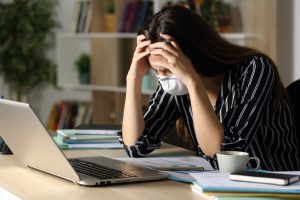 With the pandemic causing many places worldwide to be shut down, cases of depression are increasing. According to recent statistics, the number of people experiencing depressive symptoms is at least three times higher than before the pandemic.
With the pandemic causing many places worldwide to be shut down, cases of depression are increasing. According to recent statistics, the number of people experiencing depressive symptoms is at least three times higher than before the pandemic.
It is safe to say that everyone in the world is being affected by the pandemic somehow. And although many don’t even realize it, the emotional cost of living through this time is taking its toll on many people.
Advertisement
For those who are already vulnerable to depression, the pandemic is making it harder for them to cope. Even in people who are generally not prone to mental health issues, the risk of depression during the pandemic has raised considerably.
Nancy Liu, clinical professor at the University of California, Berkeley, wants people to understand how it isn’t out of the ordinary to feel symptoms of depression and anxiety while going through any type of disaster. She says, “You’re going to feel down. You’re going to feel a little hopeless or helpless. You’re not going to be as eager to connect with people and are going to withdraw.”
Types of Depression and Anxiety
It is essential to know the differences in types of depression and anxiety to help yourself or your loved ones who may be feeling out of sorts these days. It is ok to be feeling down, but depression differs from normal anxiety or sorrow and can be far more debilitating. Depression can persist for weeks and lead to an inability to function normally on a day-to-day basis.
People who suffer from depression often report loss of sleep, significant weight loss or gain, inability to get out of bed, a lack of motivation or a sense of self-worth, and finding no enjoyment from everyday activities.
If you have trouble concentrating or participating in normal daily life activities, health care professionals believe there are some steps that can be taken to help.
One of the best treatments for depression is physical exercise. During this challenging time, it is essential to take care of the body. Not getting enough physical activity has been found to induce depressive symptoms, so try getting at least 20 minutes of cardio each day.
Advertisement
It is also important to add small things into your life that you enjoy or look forward to doing. By planning small daily activities, you can help fight off feelings of helplessness that often come with depression. Studies have shown that activity scheduling is very effective at the outset with depression.
Meditation is also a treatment that many have found to reduce their depressive symptoms. As many people with depression experience negative thoughts, meditation can help ward off these thoughts and ideas. Start small, even with a minute or two a day, and practice at times when you are not highly stressed or anxious.
If you or a loved one feel as though you may be entering into a depressive state, it is important to seek professional help immediately. Liu encourages people to turn to therapy if they are feeling depressed. It can be extremely effective for overcoming mood disorders and help those who may be feeling helpless during the coronavirus pandemic
